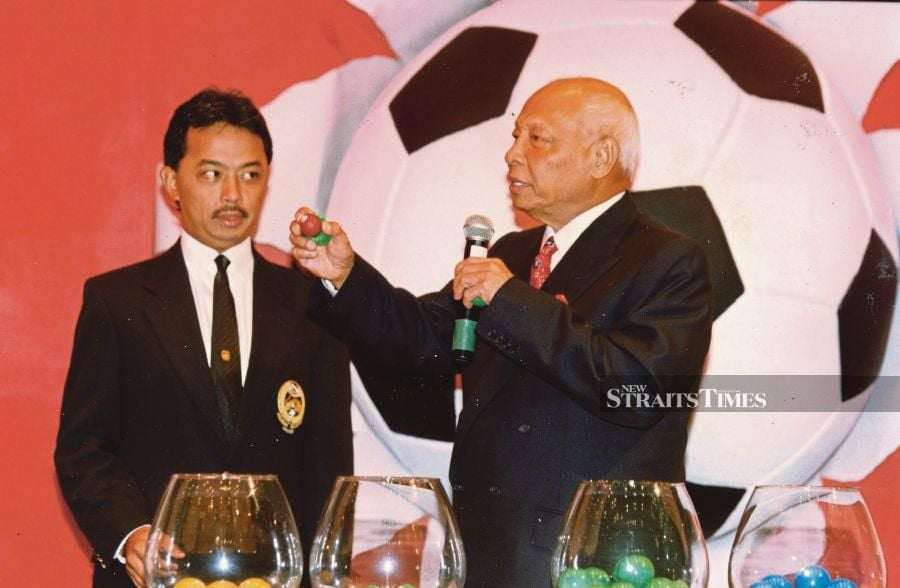Thursday,
30 May 2019, 11:48 AM
Apply
7 minute read
Dahlan Zainuddin: Gone but
not forgotten

Datuk Dahlan Zainuddin (right) in a
scene from the 1979 movie ‘Kisah Seorang Biduan’. -NSTP/File pc
KUALA LUMPUR: The
golden voice of ever-green Datuk Dahlan Zainuddin of the 70s era may have been
silenced with his passing on Tuesday, but his legacy, true to his famous song
and film, Kisah Seorang Biduan, will forever live on and be etched
in the memories of all.
Dahlan, 78, died on
Tuesday at 9.48pm at Selayang Hospital after falling into a coma since
Saturday, following a second stroke in four years.
He had touched many
from different walks of life and I was blessed that I had known him for almost
42 years.
The down-to-earth
artiste is not only friendly with his fans, but also went out of his way to
keep musicians together as a family.
Dahlan, after 40
years of being in the music industry, was still promoting musicians.
I was 19 when I
first met Dahlan in 1977 as my football captain of the New Straits
Times team.
Football was in
Dahlan’s blood and he was responsible for putting the NSTP football team in the
limelight as the captain and coach of the team when he was working as a
marketing executive with the newspaper.
How I remember my
first trip to Bangkok, thanks to Dahlan, who organised a Juara Kugiran for NSTP
staff and raised money to take the NSTP football team for friendly matches in
Bangkok by train.
Our first trip to
Kelantan was by the Sri Jaya bus with his band for concerts in Pasir Mas and
Pasir Puteh after friendly matches with local teams.
Dahlan, who played
as a forward or midfielder, first played for the Selangor Indian Association in
the Selangor league before turning out for teams like Starlight Club, Chui Lok,
Belia Sinaran and Mara.
Even when he was
older, he continued to play in the veteran team of Ulu Kelang Recreation Club.
He only stopped
playing in 2013 when he was not well and even kept away from singing for two
years.
However, it was not
long before he returned to singing in 2015 with a performance in the KTM
railway event coach to Hat Yai.
“Singing is in my
blood. I cannot stay away from it.
“Although I may
have slowed down and do not perform as many shows, I am happy that my services
are still sought and invited to perform at functions,” Dahlan said.
Dahlan continued to
perform at functions, and was helping a veteran group of buskers, Melody
Buskers. He sang with them once or twice a week at the Nasi Lemak Tanglin at
the Tanglin Community Food court near Lake Gardens.
“My presence with
them is to endorse the band and that to tell music lovers that we have good
buskers who are experienced,” Dahlan said.
Asked if he was
degrading himself by playing at a food court, Dahlan said: “I did not become a star
overnight. I had to go through the mill and start from the bottom.
“I will never
forget my roots and will always support any kind of music and played anywhere.
“Music is supposed
to be played anywhere and without the support of the masses, we will not be
popular.
“Besides, playing
at a food court allows me to meet fans and it was also an opportunity to meet
old friends in a relaxed surrounding.”

Yang di-Pertuan
Agong Al-Sultan Abdullah Ri’ayatuddin Al-Mustafa Billah Shah Sultan Ahmad Shah
Al-Musta’in Billah speaking to the widow of Datuk Dahlan Zainuddin, Datin Effa
Rizan (right), after funeral prayers at Masjid Saidina Abu Bakar As-Siddiq in
Bangsar, Kuala Lumpur, yesterday. -NSTP/MOHD YUSNI ARIFFIN
Dahlan also had
used sports to bring musicians together. On numerous occasions he organised
football friendlies with artistes from neighbouring countries and also worked
with music associations, such as Papita, Seniman and Karyawan, for many events.
He had indeed come
a long way since starting to sing as a lounge and pub singer in the early
1970s.
Dahlan made his
mark after competing in the Bintang RTM and won the Best
Performer Award in 1975.
That year, he
released his debut EP (extended play) album titled Kisah Seorang Biduan,
which proved to be a hit and he went on to record two EPs, nine LPs (long play)
and five CDs (compact discs).
He created history
by becoming the first local singer to hold a concert at Stadium Negara in 1978
and also performed at the National Stadium in Singapore.
Dahlan also
performed at the Malaysia Hall in London in 1976.
The Ipoh-born
Dahlan spent his early days in Singapore where he had his primary education at
the Telok Kurau English School before returning to Kuala Lumpur as a teenager.
He was also an
actor and starred in the movie Kisah Seorang Biduan (1979),
which was also the title of his debut album. He also acted in television
dramas.
The NSTP football
team was saddened when news of his first stroke broke and went on to organise a
tribute dinner for him in January 2017.
Datin Effa Rizan,
Dahlan’s wife of 40 years, was touched by the event held in her husband’s
honour.
“We knew about the
dinner, but we were surprised to see Dahlan’s old band here, too. I had known
these men when they were just teenagers. How they have changed,” she had said.
“Seeing all of his
old friends lifted his spirits and cheered him up.”
He almost brought
tears to everyone’s eyes when he crooned Save the Last Dance for Me,
which he sang in his well-known soft voice.
Dahlan leaves
behind Effa and their children, Natasha Idha, 40, Mohd Danial, 35 and Athinia
Ines, 24.
Another son, Akasya
Iman died at the age of 12 because of leukaemia.

















